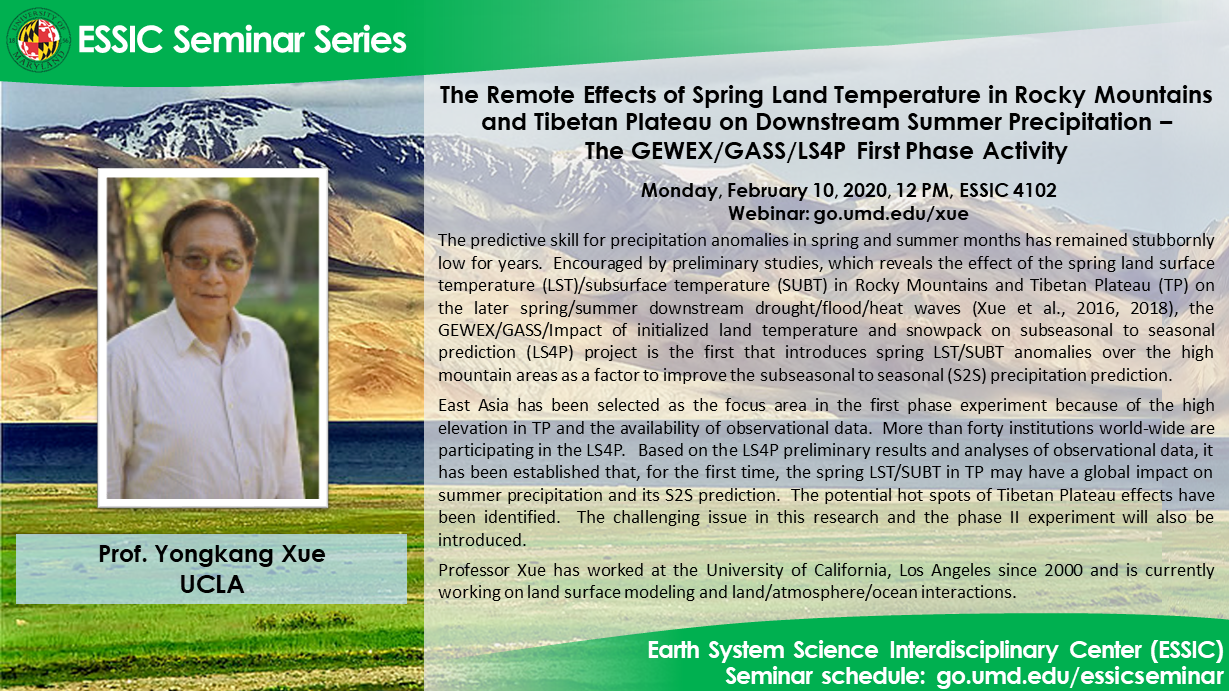
The Remote Effects of Spring Land Temperature in Rocky Mountains and Tibetan Plateau on Downstream Summer Precipitation – The GEWEX/GASS/LS4P First Phase Activity
This event has passed. View the seminar recording here:
Prof. Yongkang Xue
UCLA
Monday February 10, 2020, 12 PM
ESSIC Conference Room 4102, 5825 University Research Ct, College Park, MD 20740
Abstract:
Basin-wide tropical sea surface temperature (SST) anomalies are known to play a major role in causing extreme events, such as droughts and floods. SST has been shown to have predictive value for land precipitation. The predictive skill for precipitation anomalies, however, in spring and summer months has remained stubbornly low for years. Encouraged by preliminary studies, which reveals the effect of the spring land surface temperature (LST)/subsurface temperature (SUBT) in Rocky Mountains and Tibetan Plateau on the later spring/summer downstream drought/flood/heat waves (Xue et al., 2016, 2018; Diallo et al., 2019), the GEWEX/Global Atmospheric System Study (GASS)/Impact of initialized land temperature and snowpack on subseasonal to seasonal prediction (LS4P) project is the first that introduces spring LST/SUBT anomalies over the high mountain areas as a factor to improve the subseasonal to seasonal (S2S) precipitation prediction.
East Asia has been selected as the focus area in the first phase experiment because of the presence of the high elevation in the Tibetan Plateau and the availability of large observational data, especially over land, from the Third Pole Experiment (TPE). More than forty (40) institutions world-wide, which include many major meteorological centers, are participating in the LS4P. Four tasks have been defined. Based on the preliminary results from the experiments assigned in the four tasks and analyses of observational data, it has been established that, for the first time, the spring LST/SUBT in Tibetan Plateau may have a global impact on summer precipitation and its S2S prediction. The potential hot spots of Tibetan Plateau effects have been identified. They are the eastern part of China, South Asia, mid-latitude North America, Northern S. America, Sahel. Meanwhile, preliminary results have also shown that for many climate models it is a great challenge to preserve the imposed LST/SUBT anomalies and to reproduce the observed land surface anomalies. More tests with improved soil memory will be conducted to further confirm these effects and potentially identify more hot spots in the world. The success in the first phase research raises further scientific questions and opens the door for more research on LST/SUBT effect and relevant mechanisms. The second phase of LS4P will focus on the Rocky Mountain LST/SUBT’s effects, and will start later 2020.
Bio-sketch:
Professor Xue works at the University of California, Los Angeles since 2000 and is working on land surface modeling and land/atmosphere/ocean interactions.
References
Diallo, I., Y. Xue, Q. Li, F. De Sales, W. Li, (2019). Dynamical downscaling the impact of spring Western U.S. land surface temperature on the 2015 flood extremes at the Southern Great Plains: Effect of domain choice, dynamic cores and land surface parameterization. Climate Dynamics 53(1-2), 1039-1061. DOI: https://doi.org/10.1007/s00382-019-04630-6
Xue, Y., C. M. Oaida, I. Diallo, J. D. Neelin, S. Li, F. De Sales, Y. Gu, D. A. Robinson, R. Vasic, L. Yi, (2016). Spring land temperature anomalies in northwestern US and the summer drought over Southern Plains and adjacent areas. Environmental Research Letter, 11(4), 044018, doi:10.1088/1748-9326/11/4/044018.
Xue Y., I. Diallo, W. Li, J. D. Neelin, P. C. Chu, R. Vasic, W. Guo, Q. Li, D. A. Robinson, Y. Zhu, C. Fu, and C. M. Oaida (2018). Spring land surface and subsurface temperature anomalies and subsequent downstream late spring-summer droughts/floods in North America and East Asia. Journal of Geophysical Research: Atmospheres, 123, 5001-5019. https://doi.org/10.1029/2017JD028246
Contact:
For more details, contact Dr. William Lau, wkmlau@umd.edu
Webinar info:
Event site: http://go.umd.edu/xue
Event number: 731 322 224
Event password: essic
——————————————————-
To join the online event
——————————————————-
1. Click here to join the online event.
- Click “Join Now”.
——————————————————-
To join the audio conference only
——————————————————-
US Toll: +1-415-655-0002
Global call-in numbers
Access code: 731 322 224
——————————————————-
For IT assistance
——————————————————-
Cazzy Medley: cazzy@umd.edu
Travis Swaim: tswaim1@umd.edu
Follow ESSIC:
ESSIC homepage: http://essic.umd.edu/
ESSIC seminar schedule/archive: https://go.umd.edu/essicseminar
ESSIC seminar site: https://go.umd.edu/essicseminarsite
ESSIC Youtube: https://www.youtube.com/user/ESSICUMD
ESSIC Twitter: https://twitter.com/ESSICUMD
ESSIC Facebook: https://facebook.com/ESSICUMDs
ESSIC seminar coordinator: Dr. John Yang, jxyang@umd.edu
Contact coordinator for subscribing email announcement or giving a talk

